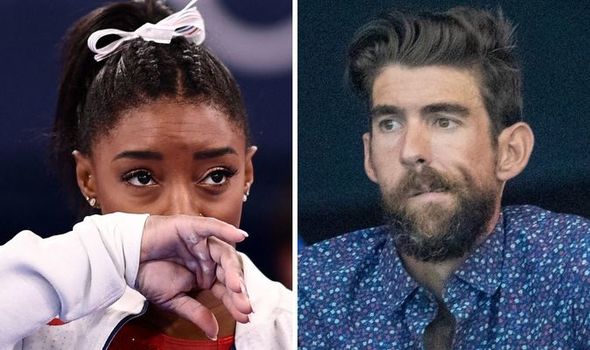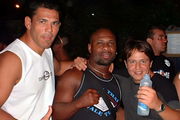
Imago
Image credits : Imago

Imago
Image credits : Imago
“Pressure is a privilege,” These words from Simone Biles‘ ring true as we look back on her Tokyo Games journey. The famous gymnast became a diamond in the rough, courtesy of the twisties that forced her to withdraw from a few Olympic events. As a 9-time Xfinity champion, Biles decided to then walk away when she was locked to become the first female gymnast to repeat as all-around Olympic champion in over half a century.
Watch What’s Trending Now!
Sparking global conversations about unwarranted expectations and athlete pressures in competitive sports, Olympic swimming legend Michael Phelps didn’t hold his words back. In a 2021 interview with TODAY, Olympic swimmer Michael Phelps rallied his support, “There’s a lot that we can do to help one another and we have to start. We can’t brush it under the rug anymore.
“It can be overwhelming, especially during a competition. It broke my heart. I hope this is an eye-opening experience, I really do. I hope this is an opportunity for us to jump on board, and to even blow this mental health thing even more wide open. It is so much bigger than we can ever imagine.”
ADVERTISEMENT

ADVERTISEMENT
Simone Biles confessed to shivering and not being able to get enough sleep during her time in Tokyo. After scoring 13.766 in the first rotation of the USA team’s vault, she was seen packing up and being escorted out of the arena by her trainer. She best described it when she said, “It just sucks when you are fighting with your own head.”
Jordan Chiles replaced the star gymnast while Biles persevered for her team. Although Biles couldn’t return to the mat until the final day of the competition, she cheered on, getting chalk for her teammates and encouraging them to push for more. On the final day, she regained enough strength to clinch the bronze on a modified routine on the balance beam. But winning a medal was not an intention as Biles later said,
ADVERTISEMENT
“I wasn’t expecting to walk away with a medal. I was just going out there doing this for me. To have one more opportunity to be at the Olympics meant the world to me.”
Far before Simone, the ground has been built by female athletes like three-time Olympic gold medalist and swimmer Allison Schmitt who spoke out about her depression at a time when female sportspersons were hardly vocal about mental health. After she lost her 17-year-old cousin April Bocian to suicide in 2015 for battles with depression no one knew about, Allison was left thinking, “How did I not know? How had we not shared that?”
She then started painfully burying suicidal thoughts, so much so that driving to go back home to her Michigan address safely came to be understood as a moment of relief. The breaking point ensued when Phelps, who had just returned from rehab that year, visited Schmitt during a swimming meet in 2015. Phelps, who she considers an elder brother, had a hunch that she wasn’t the same jolly person anymore. She “broke down and cried. It was kind of the breaking point.” Depression consumed a better part of the next three years post that development.
ADVERTISEMENT
Months later, when she cleared her US Olympic trials, she hugged her mother and offered her podium bouquet of roses to her aunt, Amy Bocian. Amy brought the bouquet close to her locket which had a black-and-white picture of her cousin who never made it back home.
Echoes of mental health crises are coming from far and wide
Notably, then-Cleveland Cavaliers forward Kevin Love had a tryst with mental health crisis when he least expected it. This was after he faced a panic attack for the first time during halftime against the Atlanta Hawks on November 5, 2017. Citing “an illness,” he withdrew from the game in the third quarter after playing for 19 minutes and scoring 4 points and 4 rebounds. It was a home loss for the Cavs with the Hawks taking away the game 117-115 that night. The details of the experience were as mouth-gapping as it sounds.
ADVERTISEMENT
“After halftime, it all hit the fan. Coach Lue called a timeout in the third quarter. When I got to the bench, I felt my heart racing faster than usual. Then I was having trouble catching my breath. It’s hard to describe, but everything was spinning, like my brain was trying to climb out of my head. The air felt thick and heavy. My mouth was like chalk.
“I remember our assistant coach yelling something about a defensive set. I nodded, but I didn’t hear much of what he said. By that point, I was freaking out. When I got up to walk out of the huddle, I knew I couldn’t reenter the game — like, literally couldn’t do it physically.”
Top Stories
Greg Biffle Plane Tragedy: What Might Have Caused the Crash That Killed the NASCAR Champ and His Family

Seahawks’ Ernest Jones IV Accuses Rams of Inappropriate Comments After Puka Nacua’s Feud With Nick Emmanwori

Patrick Mahomes’ Chiefs Extremely Close to Leaving Arrowhead Amid Kansas State’s Announcement, Per Report

Another PGA Tour Analyst to Leave Golf Channel Days After Cara Banks’ Unexpected Exit – Report

Ex-UFC Fighter, Former Wrestling Champion Dies at 63 After Health Complications

Match-Fixing Scandal Erupts in Tennis After Arrests Uncover $821K Scheme

Another athlete worthy of recognition for his mental health advocacy is Dallas Cowboys QB Dak Prescott. He went public with his feelings after losing his brother and his mother. The isolation during the pandemic only heightened these feelings of isolation and anxiety. “I obviously got the help that I needed and was very open about it.” He further added, “I think that’s why I was fortunate enough to get over it, as not all of us are.”
ADVERTISEMENT
As more and more athletes come forward to share their bits of strife and struggle, we applaud them this June for erasing the prevailing stigma around mental health crises in the sports community.
ADVERTISEMENT
ADVERTISEMENT
ADVERTISEMENT

